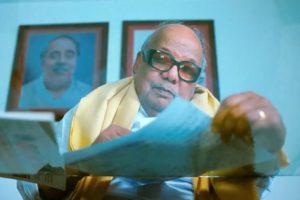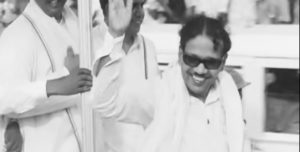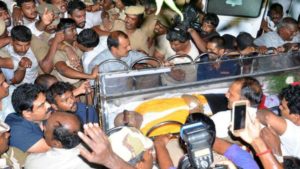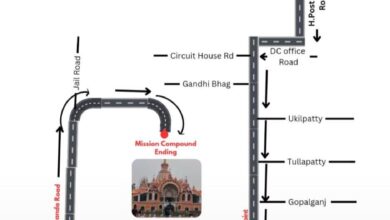India & World UpdatesAnalytics
End of a Political Saga: M Karunanidhi

The death of five-time Tamil Nadu Chief Minister and the tallest Dravidian leader, M Karunanidhi, at the age of 94, marks the end of an era. Muthuvel Karunanidhi, one of India’s seniormost politicians and a veteran flagbearer of Tamil nationalism, passed away on August 7 at the age of 94. Karunanidhi, popularly referred to as Kalaigner, or the artist, was a five-time chief minister of the southern Indian state of Tamil Nadu, first

between February 1969 and January 1971, and most recently between May 2006 and May 2011. During these decades, the state of Tamil Nadu itself witnessed multiple phases of nationalism, separatism, social upheavals, and subsequently moderation—and Karunanidhi was often a driving force of these varied impulses.
In his nearly seven decades career, he rubbed shoulders with the likes of Rajaji, Kamaraj, Periyar EV Ramasamy, and the founder of DMK and its first Chief Minister CN Annadurai; as also, with his friend-turned-foe MG Ramachandran, and the rival’s successor J Jayalalithaa. Karunanidhi’s was a turbulent political career that saw him in virtual political exile for 13 years and his government dismissed twice, first in 1976 and then in 1991. It used to be said that you can love him or hate him but you cannot ignore him. It also used to be said that if he had been born in UP, he would have become Prime Minister, given his political acumen and shrewdness.
However, in addition to being a great politician, Karunanidhi was also a poet, playwright and screenwriter and is known for his immense contribution to Tamil literature. Even before Karunanidhi began writing stories, dialogues and scripts for films, he was a well-known playwright in the state. His pla ys were known for their sharp wit, clever narrative, strong political ideologies and powerful dialogues. Even while Karunanidhi was active in Periyar’s Dravidar Kazhagam, he continued writing and staging plays, sometimes acting a part or two himself.
ys were known for their sharp wit, clever narrative, strong political ideologies and powerful dialogues. Even while Karunanidhi was active in Periyar’s Dravidar Kazhagam, he continued writing and staging plays, sometimes acting a part or two himself.
Karunanidhi, like his mentor Annadurai, essentially fought against the caste supremacy of the Brahmins, who, in the Dravidian worldview, were originally from northern India and had for millennia suppressed the lower castes. The movement sought to improve the socio-political and economic status of these backward castes. After Rajaji and Kamaraj, it was Karunanidhi who had close rapport with several top national leaders from various parties. That way, he made the DMK spread its wings, but he stayed rooted in Tamil Nadu.
Failing health forced his withdrawal from politics over the last few years and the vacuum was immediately felt. The 2016 state poll was handled mostly by Stalin, and the son’s decision then to ally with a failing Congress while Jayalalithaa was striking out on her own was criticised after the polls. In January 2017, with his father’s health worsening, a teary-eyed Stalin stepped on to the stage at a function in Chennai, signifying a change of era.
Following a hard-fought legal victory by the DMK to secure a place at the Marina Beach for his mortal remains, former DMK supremo and five-time Tamil Nadu chief minister, Muthuvel Karunandhi was laid to rest next to his mentor and Dravidian leader CN Annadurai on Wednesday in a casket engraved with the words, “A man who never rested is now resting.”




